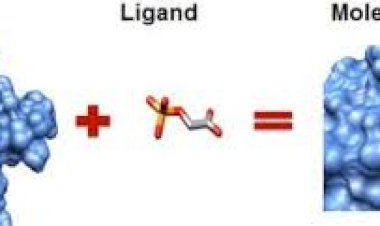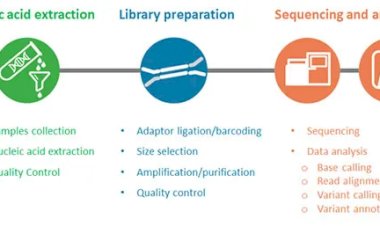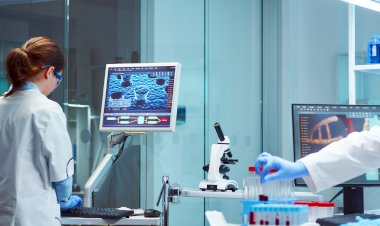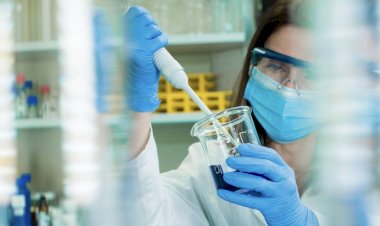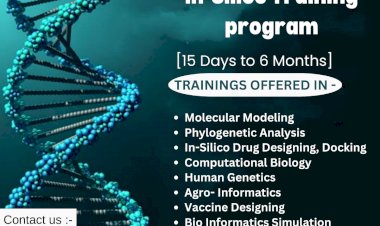In-Silico Training Programs

In-Silico Training Programs: Transforming Biological Research with the Power of Computational Biology
In the rapidly advancing world of biological sciences and research, the landscape is continuously evolving. From drug discovery to genetic engineering, the field is experiencing revolutionary transformations. One key area driving this change is in-silico science, where computational simulations and models are used to study biological processes, significantly speeding up research and development. This shift towards a computational approach has led to a demand for professionals skilled in in-silico techniques.
In this blog, we will explore the growing importance of in-silico training programs, their role in enhancing job opportunities, and the unique contribution of Indian biological sciences and research institutes to this field. Additionally, we will provide deep insights to guide students and professionals seeking to carve a successful career in in-silico research.
What is In-Silico Training?
In-silico refers to the use of computational methods to simulate biological processes and analyze large datasets. The term is derived from the Latin word silicium, the material used in computer chips. In the context of biological sciences, in-silico techniques allow researchers to model biological systems, predict drug interactions, simulate genetic mutations, and much more—all from a computational platform.
In-silico training programs equip professionals with the necessary skills to:
- Analyze complex biological data using bioinformatics tools.
- Simulate molecular interactions for drug development.
- Predict genetic mutations and their implications.
- Model biological systems to understand disease mechanisms.
- Optimize clinical trials by pre-screening drug compounds computationally.
These programs are designed to bridge the gap between biological theory and computational application, making it easier to conduct faster and more efficient research.
Why In-Silico Training is Crucial in Today’s Job Market
The demand for professionals with in-silico skills is growing exponentially. Here's why:
-
The Shift Towards Precision Medicine
With the rise of precision medicine, there is an increasing focus on personalized treatment approaches based on genetic information. In-silico techniques are used to analyze genetic data, identify biomarkers, and predict patient responses to different treatments. This shift in healthcare has created a demand for professionals who can merge computational techniques with biological research to tailor therapies to individuals. -
Faster Drug Discovery and Development
Traditional drug discovery methods are time-consuming and expensive, often taking years to develop a single drug. In-silico methods accelerate this process by screening large libraries of drug compounds, predicting interactions, and optimizing lead candidates before clinical trials begin. This has created opportunities for individuals skilled in computational chemistry, molecular modeling, and pharmacoinformatics. -
Cost-Effectiveness
Using in-silico methods to simulate experiments can reduce the need for expensive lab work and animal testing, making research more cost-effective. In an industry where funding is often limited, companies and research institutes are looking for professionals who can leverage computational methods to reduce costs while still driving innovation. -
Interdisciplinary Applications
In-silico approaches are not just limited to drug discovery—they are used across disciplines such as genomics, proteomics, systems biology, synthetic biology, and ecological modeling. This makes professionals with in-silico expertise highly versatile and employable across multiple sectors.
Expanding Job Opportunities Through In-Silico Training
Completing an in-silico training program can ope
n doors to various career opportunities in biological sciences, biotechnology, and pharmaceutical industries. Here are some of the top career roles for in-silico professionals:
-
Bioinformatics Specialist
These professionals analyze biological data, such as genetic sequences, using computational tools. They play a key role in genomics, proteomics, and other fields that require data-driven research. -
Computational Biologist
Computational biologists develop mathematical models and simulations to understand biological systems. They often collaborate with laboratory scientists to validate findings and contribute to breakthroughs in areas like cancer research, immunology, and neuroscience. -
Molecular Modeler
Molecular modelers use in-silico techniques to design and optimize molecular compounds, making them essential in drug discovery and materials science. -
Systems Biologist
Systems biologists create computational models of entire biological systems (such as cells or organs) to understand complex interactions and predict how systems behave under different conditions. -
Data Scientist in Life Sciences
The growing emphasis on data analytics has also impacted biological sciences. Data scientists with a background in life sciences and in-silico training can analyze large datasets, uncover patterns, and provide insights that drive research forward. -
Research Scientist
Many research positions now require proficiency in computational biology and in-silico techniques, particularly in academic institutions, biotech firms, and pharmaceutical companies.
The Role of Indian Biological Sciences and Research Institutes in Promoting In-Silico Training
The Indian Biological Sciences and Research Institute (IBRI) is a leading private institute in India, offering specialized in-silico training programs in areas like bioinformatics, computational biology, and drug design. IBRI prepares candidates for the evolving biological sciences field through:
- Comprehensive Training Programs: Covering bioinformatics, molecular modeling, and data analytics.
- Industry-Relevant Curriculum: Designed with industry input to match current trends.
- Expert Faculty: Mentorship from experienced professionals in the field.
- Workshops and Certifications: Focused on niche topics to enhance skills quickly.
- Collaborative Research: Opportunities to work on real-world projects.
Conclusion
As biological research increasingly shifts towards computational methods, mastering in-silico techniques is becoming essential for scientists and researchers across the globe. The Indian Biological Sciences and Research Institute (IBRI) offers world-class training programs that prepare students and professionals to excel in this rapidly evolving field.
Whether you’re a biologist looking to expand your computational skills or a student aspiring to enter the world of bioinformatics and drug discovery, IBRI’s in-silico training programs provide you with the knowledge, tools, and practical experience to succeed.
#Insilicotraining #computationalbiology #bioinformatics #drugdiscovery #molecularmodeling #systemsbiology #biotechresearch #bioinformaticstraining #biologicalsciences #indianresearch #datainbiology #genomics #ibricourses

 Manju
Manju 









